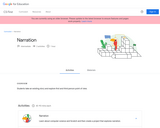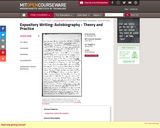
Students take an existing story and explore first and third person point of view.
- Subject:
- Applied Science
- Computer Science
- English Language Arts
- Material Type:
- Activity/Lab
- Author:
- Date Added:
- 04/10/2020

Students take an existing story and explore first and third person point of view.

Subject focused on forms of exposition, including narration, critique, argument, and persuasion. Frequent writing assignments, regular revisions, and short oral presentations are required. Readings and specific writing assignments vary by section. See subject's URL for enhanced section descriptions. Emphasis is on developing students' ability to write clear and effective prose. Students can expect to write frequently, to give and receive response to work in progress, to improve their writing by revising, to read the work of accomplished writers, and to participate actively in class discussions and workshops. Focus: What can we believe when we read an autobiography? How do writers recall, select, shape, and present their lives to construct life stories? Readings that ground these questions include selections from Incidents in the Life of a Slave Girl by Linda Brent (pseudonym for Harriet Jacobs), "A Sketch of the Past" by Virginia Woolf, Notes of A Native Son by James Baldwin, "The Achievement of Desire" by Richard Rodriguez, The Woman Warrior by Maxine Hong Kingston, and "Our Secret" by Susan Griffin. Discussion, papers, and brief oral presentations will focus on the content of the life stories as well as the forms and techniques authors use to shape autobiography. We will identify masks and stances used to achieve various goals, sources and interrelationships of technical and thematic concerns, and "fictions" of autobiographical writing. Assignments will allow students to consider texts in terms of their implicit theories of autobiography, of theories we read, and of students' experiences; assignments also allow some autobiographical writing.

Lesson OverviewIn this lesson, students will be introduced to Edgar Allan Poe's theory on the “single effect” of the short story. They will read a passage from Poe as well as his short story “The Tell-Tale Heart.”Lesson PreparationRead the lesson and student content.Anticipate student difficulties and identify the differentiation options you will choose for working with your students.Decide how you will put students in pairs for the lesson's tasks.